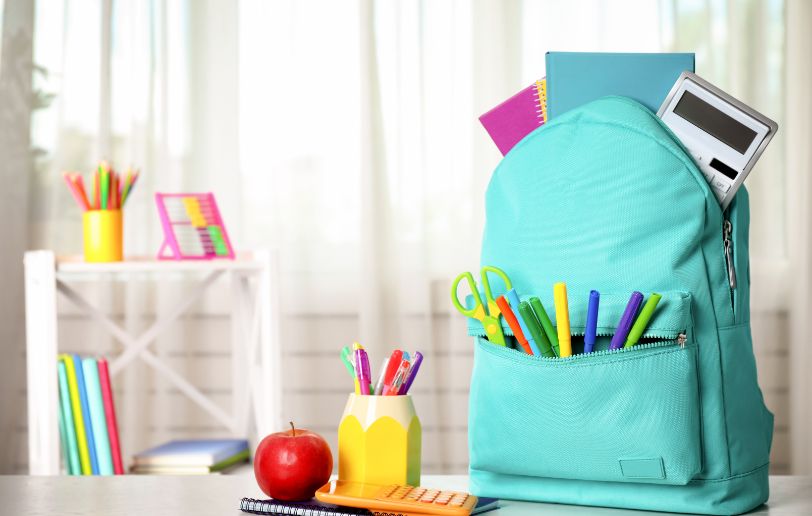Helping anxious children returning to school
Here, we look at ways to support your child if they are anxious about returning to school.
Returning to school after the summer holidays can be really daunting for some kids. There are plenty of emotions involved, from excitement and eagerness, all the way to worry and fear. Vague concerns about returning to school are common but if your child is really struggling, they may need some focused support from you. What does that involve?

Talk through the steps of returning to school
Let your little one know that nerves are normal. All kids (and parents!) find it a challenge to adjust back to the school routine – like any change, it brings up some amount of anxiety. Reassuring your child that they are not alone in feeling this way can help settle their stress, as does the gentle reminder that fear and courage can exist together and their worries will likely disappear after a few weeks, once they get used to being at school again.
Talk about specific concerns
Sit down together and chat through which concerns they’re finding particularly stressful. For younger kids it could be saying goodbye to you at drop off, being left out or speaking to new people. Older children might be more worried about exams, changing friendships, loneliness or problems with teachers. Teens tend to get anxious about study pressures, coping with stress and looking after their overall mental health. Ask directly and make sure to find out the specific things that are weighing on your child’s mind.
Remind your child about the sense of belonging
Feeling a part of school life can impact social wellbeing, academic results and happiness for the better, whereas feeling apart from everything in school has the opposite effect. A sense of belonging starts at home with a positive and relaxed attitude from parents, as kids mirror what they hear from you and will likely adopt the same approach. It’s good to use an encouraging tone when discussing school and remember to focus on the exciting things about returning, like seeing friends, making new ones, buying cool school supplies, trying new activities or getting back into old ones. Feeling acceptance at school and at home in regards to school plays a big role in how well your little one will reintegrate into school life. Make sure to show lots of kindness around this tricky topic and give your child a few weeks back to properly adjust.

Prepare your child for returning to school
Psychologically speaking, kids will feel more confident and capable if they are prepared on a practical level. This means making sure they have the right books, uniform (if applicable) and proper sports gear ahead of time. It can also be supportive to write down or go through any need-to-know information with your child, such as what time classes begin and finish, when lunch is, when collection times or after school activities are happening for each day of the week etc. Some basics should also be thought through, like reasonable bedtimes to get enough sleep, healthy breakfast ideas for proper energy in the classroom and an evening organisational routine. That usually involves children putting homework and books in their school bag the night before and laying out the next day’s clothes to make things easier if they wake up sleepy!
Sometimes parenting is about not doing things for your kids and instead, making them responsible for tasks themselves. Unfortunately, it’s the children whose parents do everything for them that flounder and feel most helpless when they find themselves alone in a challenging situation such as school.
Give them manageable jobs
Help your little one build up a sense of independence by encouraging them to stand on their own two feet in small ways, like making their own breakfast or packed lunch, or perhaps, getting themselves to school if they are old enough to do so safely. Anything that grows independence will also grow their self-confidence and trust in themselves to cope with various situations, as well as an internal feeling of resilience.
Help develop their confidence
Instead of fighting battles for them, try using phrases like “I’m so confident you’ll handle it” or “I know you can do it”. However, be careful to stay compassionate and ensure that your little one feels seen, heard and validated. Empowering your child means finding a balance between empathising with their worries and encouraging them to face their fears. Respond warmly to any anxieties they share and unpack the source of their worry. Supportive sentences like “That sounds really difficult for you” acknowledge their emotions and are an important step before you encourage them to deal with their fears.

Balance it with family activities
Kids can feel a sense of loss when the school year begins. Sometimes school anxiety is not just made up of stress about school, but also based on a perceived lack of fun and enjoyment in their week. It makes sense that they might dread school if they don’t feel like they have anything else going on to enjoy. So, try and make an effort to plan some nice activities for evenings and weekends. Perhaps a game night, baking together on Sundays or a weekend hike – it doesn’t have to be complex, just a little fun to brighten their day. Providing kids with something to look forward to outside of school gives them a sense of optimism and relaxation that makes it easier to navigate the stresses of school.
Checking in with your child & listening
Make the time to ask your child about their day consistently. Listen to what they have to say, ask questions so they know that you are interested in their life. Let them tell you all about what’s going on (and no doubt there will be a lot to say at the start!) and try to continually gauge how they’re handling the school environment. By keeping the lines of communication open, you will be much better informed to help them tackle any issues that may arise throughout the year.
It’s completely fine to be worried by a new situation, but if you suspect your child’s worries go beyond the usual back-to-school jitters, don’t hesitate to talk to the teacher, school or your family doctor.











Comments